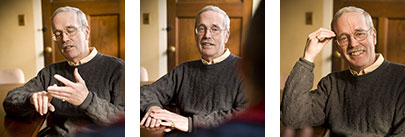McGill's iconic, ironic cheerleader
McGill's iconic, ironic cheerleader McGill University
User Tools (skip):

No one is safe from the rapier wit of Leacock Luncheon moderator Derek Drummond. He says Chancellor Richard Pound is one of his favorite targets because "we're great friends and I know I'll get it back in spades at some point."
Entre Nous with Derek Drummond, Interim Director of Athletics
McGill's iconic, ironic cheerleader
Having first said "Hello" to McGill more than 50 years ago as a fresh-faced architectural undergrad, Derek Drummond has found it difficult to say "Goodbye." Although, as anyone who has seen this iconic and ironic professor emeritus moderate the annual Leacock Luncheon will attest, it's about the only thing Drummond has trouble saying. On Sept. 1, 2005, Drummond began his tenure as Interim Director of Athletics, adding to a CV that includes long stints as Director of the School of Architecture, as Vice-Principal of Development and Alumni Relations and some 40 years as a professor of architecture. With his mandate slated to end on May 31, Drummond reflected on what has proved to be a busy 18 months.
How did the former Director of the School of Architecture become the Director of Athletics?
[Laughing] I blame my complete inability to say "no."
With the recent adoption of an anti-hazing policy by Senate, is it safe to say we've turned the page on the issue?
Absolutely. There's no question that valuable lessons were learned, not only by the football team but by all athletes. First, hazing is not a good team-building exercise and, second, it goes against the rules of the university. We've made it clear that the penalties for doing it are severe — teams will have their season cancelled. That gets the attention of elite athletes.
How does a team go about building that elusive camaraderie that is so essential for on-field success?
McGill's teams are involved in a whole range of activities ranging from white-water rafting and rock climbing to hospital visits and a variety of community work. For example, the football team has been working in a youth football program in Pointe St. Charles and the basketball team has been running basketball clinics for disadvantaged kids.
Speaking of success, McGill set a Canadian Interuniversity Sport record in 2005-2006 with 147 Academic All-Canadian Athletes. Were you surprised by this lofty number?
Not at all. We have a real tradition here at McGill. Elite athletes also have to be elite academics. No one gets in here just because they're good at sports.
For me, the far more interesting issue is why our athletes do so much better in the classroom than the rest of the student body. The cumulative grade point average of the elite athlete is significantly above that of the rest of the campus.
Any theories on why that is?
They lead a far more disciplined life than the average student. Disciplined to the extent that the hours of their day are carefully planned. They also help one another and the coaches keep on them with respect to their academic work.
I would hasten to say that, on average, the students who have participated in athletics, both as elite and recreational athletes, find that their experience here has been greatly enriched. As alumni, if they look back at their time at the university, almost at the top of their list will be the good times they had and the friends they made on the playing fields and in the gyms.
When I was VP of Development, time and time again, I would see that so many of our volunteers and major donors were varsity athletes.
You always speak of the student-athlete with such admiration. It sounds like this has been a labour of love.
The best part is that the staff here is so great that I'm free to be the cheerleader [laughing]. I'm always at a game or a practice because I think it's the job of the athletic director to be very closely involved with the athletes.
I have four sons, all good athletes, and I never missed one of their games. Now I like to say that I have 900 sons and daughters who I watch play. It's so much more fun cheering for a team when you know the people in the game. Of course, I get nervous as hell watching. I have a record that I've never sat down to watch a hockey game. I pace. Constantly.
Among your many McGill hats, none seems as much fun as that of moderator for the Leacock Luncheon. How long have you been slinging your barbs there?
I've been at it for 17 years, or 47 luncheons in Montreal, Toronto, Calgary and Vancouver.
Over the years you've had some heavy hitters at the head table. Has there ever been anyone too "big" to poke fun at?
Oh no, no, no. On the contrary, I've skewered many major politicians, businessmen and people from the arts — people that normally get kowtowed to. In many ways, the more important the person is, the better they take it. They often have a great sense of humour that has to be restrained professionally. Luckily, I don't know how to be politically correct. I don't believe in it.

